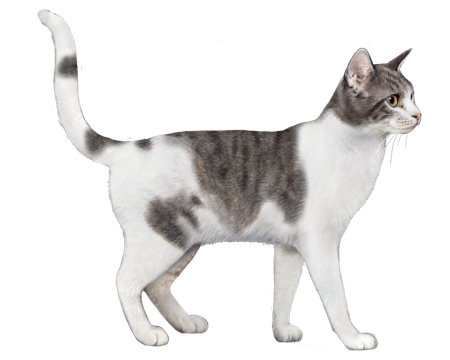
Egyptian Street Cat
Egyptian street cats are domesticated cats that live independently in cities and villages throughout Egypt.
Interested in discovering if your cat is an Egyptian Street Cat?
Check out Wisdom Panel's DNA test.
Egyptian Street Cat Traits
General Appearance
Egyptian street cats come in all shapes and sizes. Signs of a life-long street cat—versus a stray cat who may be lost—include a clean, well-kept coat, protective body language, and lack of eye contact. Because they are intact, male street cats may have thick necks, muscular bodies, and scars from fighting.
Coat and Coloring
The coat of the Egyptian street cat is typically short and can come in all colors and patterns.
Distinctive Physical Traits
Because they do not follow a breed standard, Egyptian street cats may have any combination of physical features.
Egyptian Street Cat Temperament
Egyptian street cats often live in groups and congregate near food sources and shelter. Though they may live in densely populated cities or towns, they are not typically accustomed to human contact. Some are fearful of being handled or confined. But others can adapt to interactions with people and learn to live indoors.
Egyptian Street Cat History
Like all domestic cats, Egyptian street cats can trace their roots back to the African Wildcat. Experts believe ancient Egyptians tamed these wild cats and used them to protect their grain supplies from rodents 10,000 years ago.
People in Egypt worshipped cats and considered them sacred. In addition to depicting them in ancient artwork, they presented mummified cats as offerings to the cat goddess Bastet. Remains of some pet cats were even buried in tombs alongside their owners, with the hope they would remain together in the afterlife.
Though cats in Egypt today are not as revered, many still consider them beloved companions. In addition to pet cats, street cats are plentiful in Egypt—particularly in busy cities such as Cairo. And some people believe the ancestors of cats that lived with pharaohs still roam Egyptian streets.
Egyptian Street Cat Care
Nutrition
An Egyptian street cat's diet typically consists of whatever they can find—scraps from trash cans, birds and rodents, handouts from kind strangers, and so on. If you're leaving food out for a street cat, they will benefit from the same commercially prepared diets as pet cats.
Grooming
Street cats are typically meticulous self-groomers that keep their coats relatively clean. If you've taken in a street cat that will tolerate it, regular brushing and nail trims will help keep them in tip-top shape.
Health
Egyptian street cats are susceptible to the same diseases as pet cats—including rabies, distemper, feline immunodeficiency virus, and feline leukemia. They are also at risk for numerous internal and external parasites and health issues associated with poor nutrition.
Breed Group
Free-roaming
While sharing similar characteristics with domestic pet cats, Free-Roaming cats are a genetically diverse group which are adapted to spending an independent life outdoors with little to no reliance on humans for their needs.
Resources
https://bigcatswildcats.com/african-wildcat/
https://carnegiemnh.org/why-were-cats-mummified-in-ancient-egypt/
https://www.alleycat.org/resources/feral-and-stray-cats-an-important-difference/
https://icatcare.org/unowned-cats/the-different-needs-of-domestic-cats/
https://www.knowyourcat.info/lib/feralcats.htm
https://www.humanesociety.org/sites/default/files/docs/caring-community-cats-overview.pdf
Reviewed February 23, 2021 by Annette Louviere, DVM







